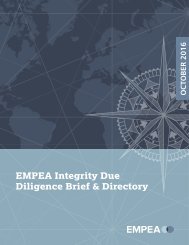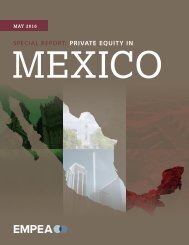Create successful ePaper yourself
Turn your PDF publications into a flip-book with our unique Google optimized e-Paper software.
Get Integrated – Present a United African Story<br />
• Recognise that African centres stand separately but fall together. Encourage regional groupings, regional joint<br />
commitments, regional cross-recognition (e.g., <strong>of</strong> qualifications), regional information and reporting, a measure <strong>of</strong><br />
regional marketing. Of these, the focus might be most on cross-recognition <strong>of</strong> pr<strong>of</strong>essional standards (e.g.,<br />
accountancy, securities trading, banking, legal – in line with the FTQI point below), and the establishment <strong>of</strong> right-towork<br />
agreements which would facilitate cross-border trade and investment, e.g., no need for a visa for three months<br />
financial services work by a qualified pr<strong>of</strong>essional.<br />
• Establish information sharing agreements, particularly about statistics on financial services and investments.<br />
• Consider the application <strong>of</strong> voluntary standards markets, e.g., ISO standards, for processes, perhaps development<br />
<strong>of</strong> an ISO standard for a well-run financial centre which in turn would be audited by the major certification agencies,<br />
equally areas such as anti-money laundering (AML) or know-your-customer (KYC) are amenable to this process<br />
certification approach.<br />
• Develop regional securitisation standards to build scale, e.g., emulate the Hedge Fund Standards Board or the<br />
Climate Bond Initiative in African investment themes such as mining, tourism, or forestry. These would help investors<br />
invest cross-border by providing sufficient deal flow outside the capability <strong>of</strong> a single country.<br />
Get Better – Pr<strong>of</strong>essional and Firm Accreditation and Certification<br />
• Consider establishing a regional Financial Training and Qualifications Institute (FTQI) drawing upon the Chartered<br />
Institute for Securities & Investment (CISI), City and Guilds, CFA, ACCA, and other organisations that can deliver<br />
accreditation and certification to training at a vocational level. The FTQI would set standards for practitioner and<br />
regulator training, and academic development for the financial sector. The FTQI would be an accreditor <strong>of</strong> other bodies<br />
(e.g., trainers) that would certify. Only world-class accreditation will suffice. It follows that certification would best be<br />
provided in partnership with leading international bodies, probably a limited number <strong>of</strong> core partnerships. AN FTQI<br />
could be somewhat ‘virtual,’ i.e., pulling together existing international and regional resources. The virtual resources<br />
should be spread throughout the region to help draw the region together on financial training and qualifications. An<br />
FTQI would need to be rigorous in its accreditations and certifications and still have some ‘physical core’ (with the<br />
regional jostling or, more positively, competition to host which that implies). To make an impact efficiently MOOCs<br />
(Massive Open Online Courses) and train-and-certify-the-trainer schemes are almost essential. The support and<br />
close involvement <strong>of</strong> regulators (particularly Central Banks) is desirable. The general assent and agreement <strong>of</strong><br />
governments would be necessary, but they can have a back seat role. Ideally some some elements <strong>of</strong> compulsion,<br />
e.g., all participating countries require regulators and government <strong>of</strong>ficials involved in financial services to have<br />
achieved a minimal qualification, would help both to raise standards in the region more rapidly and to underwrite<br />
government commitment to the pr<strong>of</strong>essional improvement the FTQI is required to deliver. Following several years <strong>of</strong><br />
mutual recognition to bind things together, longer-term an FTQI should move to standardising regulations across the<br />
region leading to consistent qualifications, testing, and certification.<br />
• Consider having such an FTQI build an online pr<strong>of</strong>essional community consisting <strong>of</strong> areas such as:<br />
– A guide for existing courses and publicise those courses deemed to meet defined standards and criteria;<br />
– A centre for online training and courses, including certification, testing, and rating such courses;<br />
– Specifically commission courses in specific areas with specific characteristics and to defined standards;<br />
– Provide a portal for research; and,<br />
– Publicise conferences meeting defined criteria.<br />
• Consider having such an FTQI develop a “Who’s Who” and “What’s What” directory on the regional industry,<br />
publishing relevant accreditations and certifications. The lack <strong>of</strong> comprehensive information means that even those<br />
within the industry have little idea <strong>of</strong> what is going on in different parts <strong>of</strong> the region, unless it is in their own particular<br />
market niche. Linking this with a jobs portal both provides a strong link to qualifications and partially answers individual<br />
members’ questions on ‘what’s in it for me?’<br />
132 |





